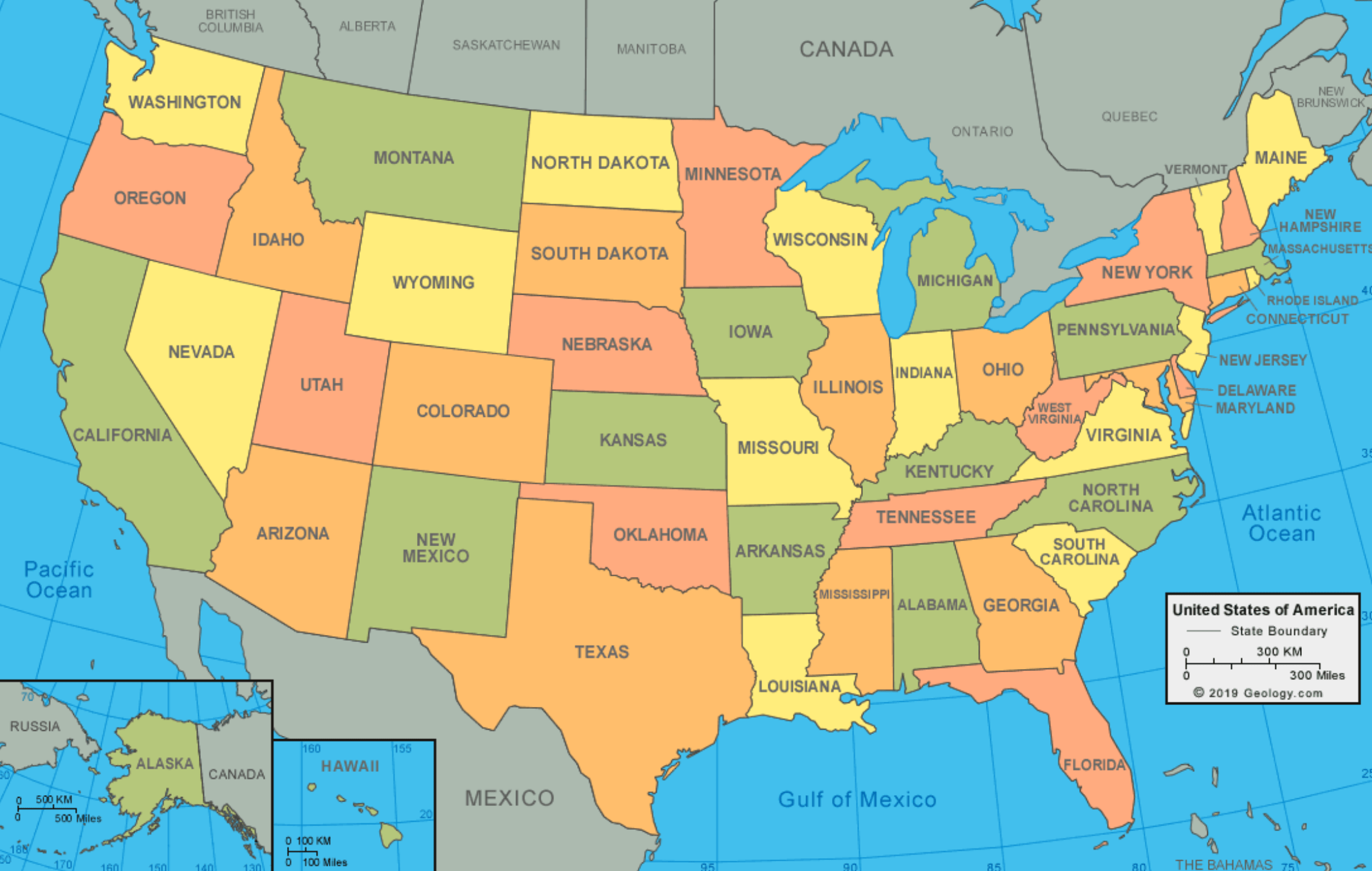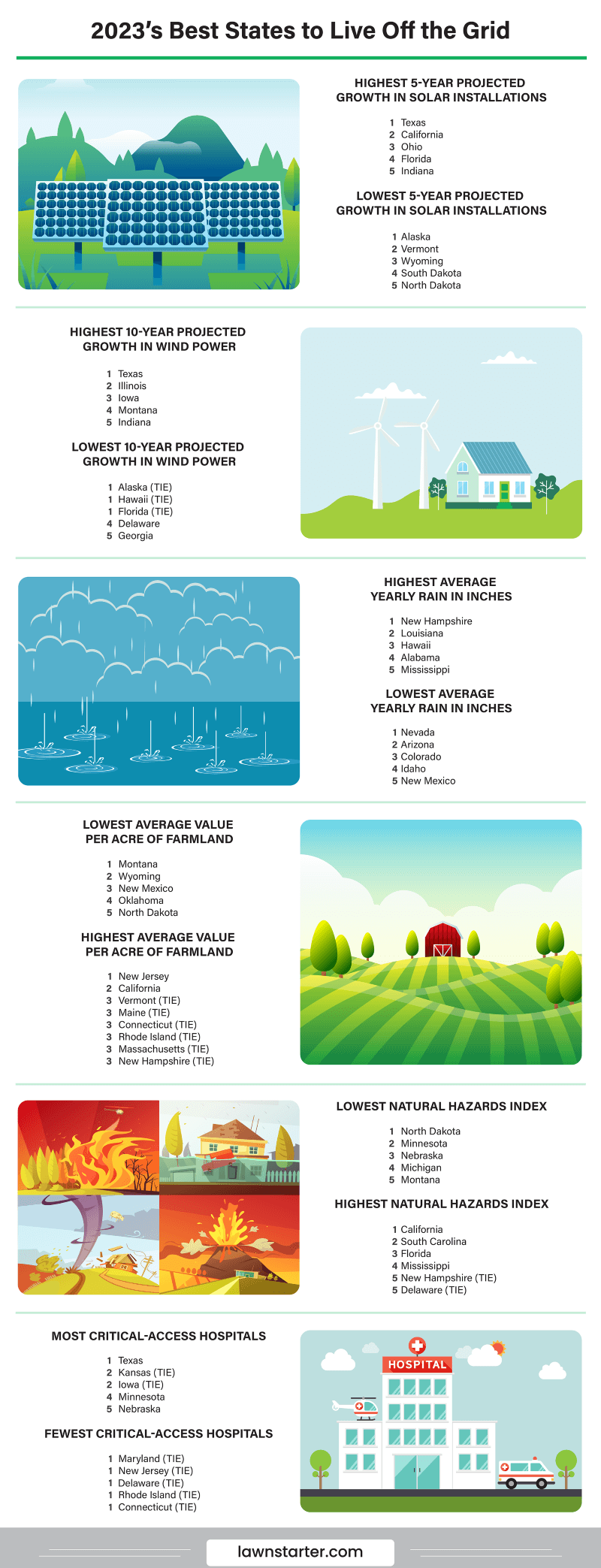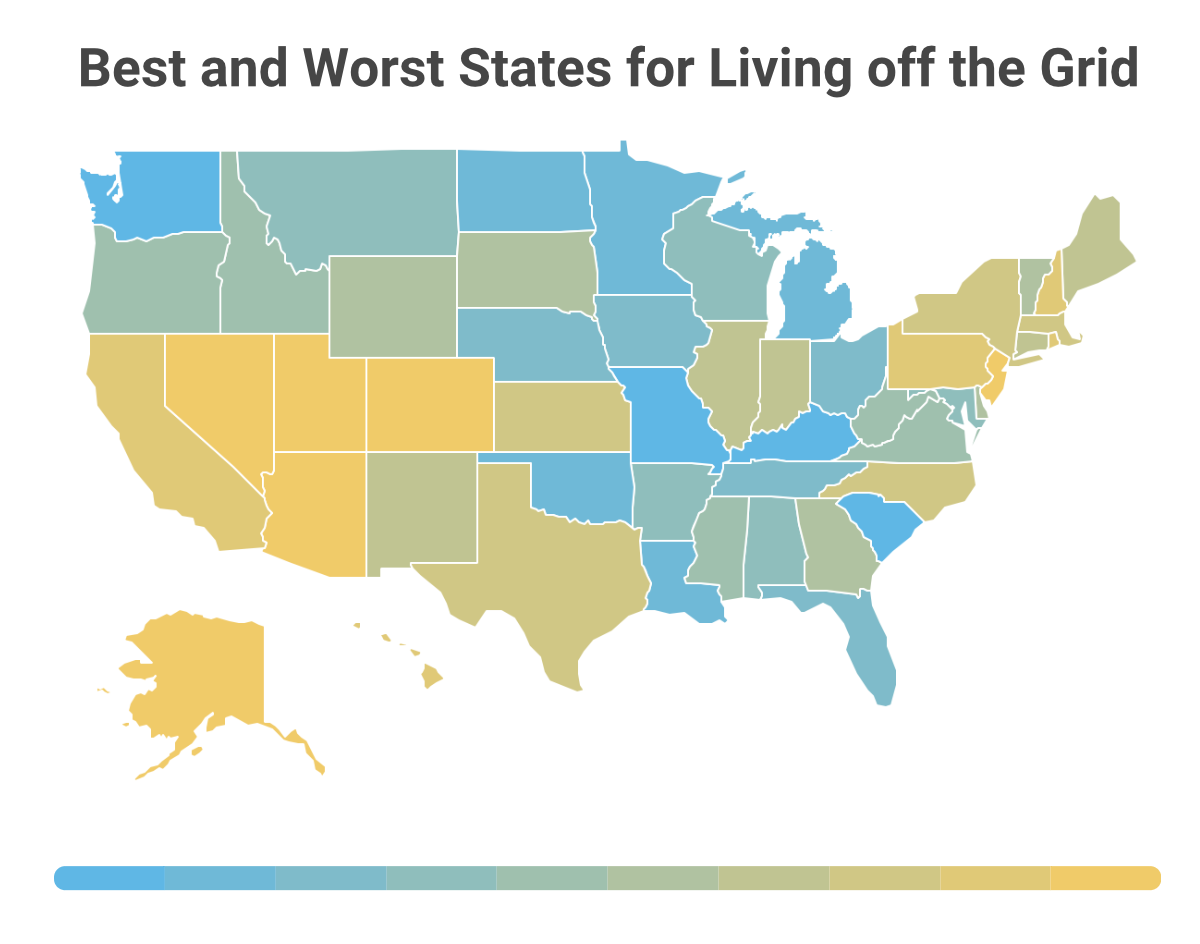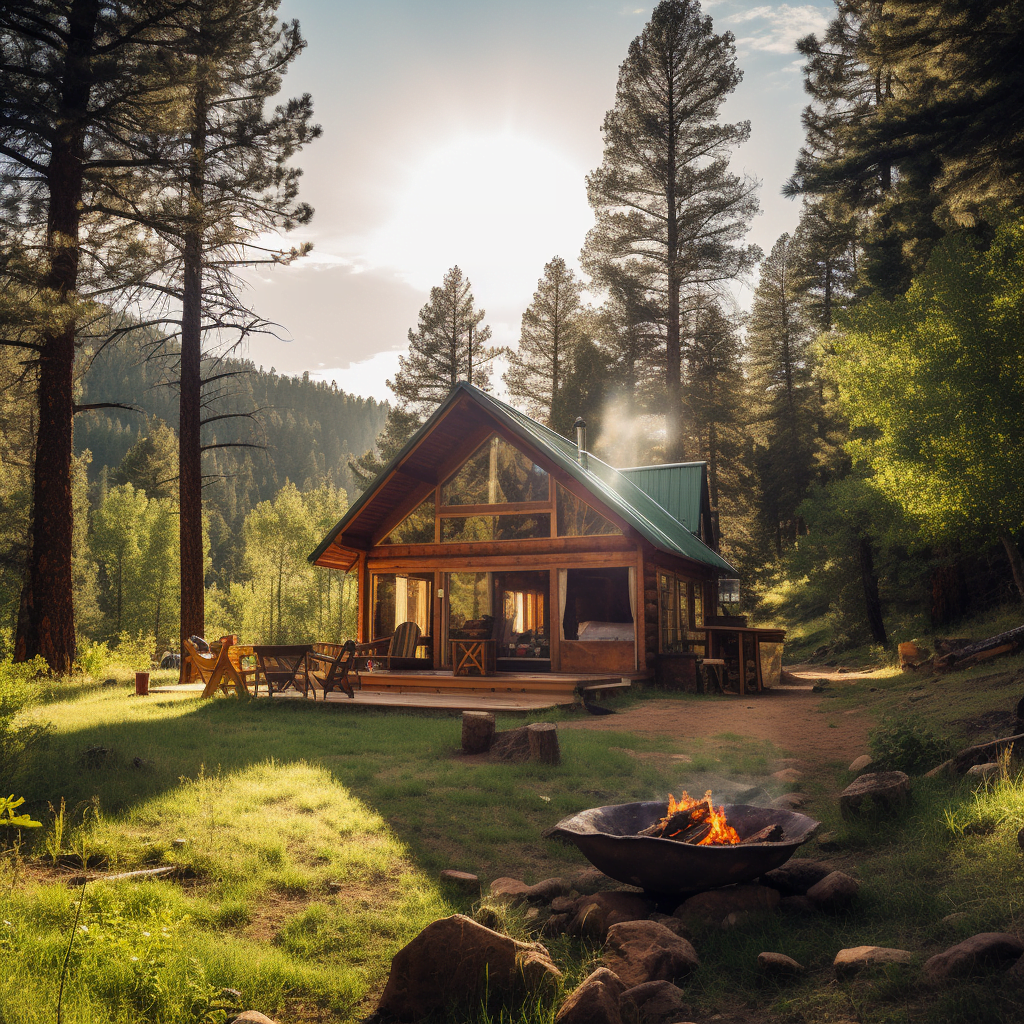If you’ve ever dreamt of living off-grid, away from the hustle and bustle of city life, then you’ll be glad to know that there are several states in the US that are perfect for that lifestyle. From the wide open spaces of Texas to the serene mountains of Vermont, these states offer an ideal environment for those looking to disconnect from the grid. However, not all states are created equal when it comes to off-grid living. While states like Virginia and Missouri provide a welcoming environment, others such as Hawaii and California pose more challenges. From restrictions and regulations to incentives and resources, each state has its own pros and cons. So, if you’re thinking of making the leap to off-grid living, do your research and find out which state suits your needs best.
The Best States for Off-Grid Living
Living off the grid has become a popular lifestyle choice for many individuals and families in the United States, as it offers independence, self-sustainability, and a closer connection to nature. If you’re considering off-grid living, you may be wondering which states are the best for this lifestyle. Here are some of the top contenders:
Texas
Texas is known for its vast land and wide-open spaces, making it an ideal state for off-grid living. With its abundance of sunshine and wind, renewable energy sources such as solar panels and wind turbines are highly effective here. Additionally, the cost of living in Texas is relatively low, allowing off-gridders to stretch their budgets.
Idaho
Idaho is often recognized as one of the best states for off-grid living due to its breathtaking landscapes and affordable land prices. With its diverse climate, you can experience all four seasons, making it suitable for a variety of off-grid activities. Furthermore, Idaho offers an abundance of natural resources, making it easier to live sustainably.
Missouri
Missouri is a hidden gem when it comes to off-grid living. With its affordable land prices and friendly regulations, it’s an attractive option for many. The state also experiences a moderate climate, making it easier to live comfortably off the grid. Missouri’s strong sense of community and support for self-sustainability further add to its appeal.
Virginia
Virginia boasts a favorable climate and an abundance of natural resources, making it a top choice for off-grid enthusiasts. The state is known for its beautiful landscapes and diverse wildlife, allowing residents to connect with nature while living sustainably. Virginia is also home to a supportive off-grid community, providing valuable resources and support.
Maine
Maine is an off-grid living paradise, with its picturesque landscapes and strong sense of self-sustainability. The state experiences four distinct seasons, allowing residents to fully embrace the benefits of off-grid living throughout the year. Additionally, Maine offers a wide range of resources and support for those choosing this lifestyle.
Wyoming
Wyoming is an off-grid haven, offering stunning landscapes and a low population density. With wide-open spaces and rugged terrain, Wyoming provides ample opportunities for self-sustainability and living off the grid. The state’s strong support for renewable energy and self-sufficiency make it an attractive option for those seeking a more sustainable lifestyle.
Vermont
Vermont’s commitment to environmental sustainability and renewable energy make it an excellent state for off-grid living. The state offers numerous incentives and rebates for those interested in generating their own power through solar panels or wind turbines. Vermont’s charming small towns and sense of community further contribute to its off-grid appeal.
Michigan
Michigan offers a diverse climate and ample natural resources, making it a great state for off-grid living. With its vast forests and Great Lakes, residents can fully embrace a self-sustaining lifestyle and connect with nature. Michigan also has a supportive off-grid community, providing valuable resources and knowledge to those choosing this lifestyle.
Tennessee
Tennessee’s mild climate and low cost of living make it an inviting state for off-grid living. With its rolling hills and picturesque landscapes, residents can enjoy the beauty of nature while living sustainably. Tennessee is also known for its strong sense of community and support for renewable energy, making it an ideal choice for off-grid enthusiasts.
Oklahoma
Oklahoma offers a range of benefits for off-grid living, including affordable land prices and a favorable climate. The state experiences plenty of sunshine, making it ideal for solar power generation. Oklahoma’s strong agricultural traditions also contribute to its off-grid appeal, as residents can grow their own food and live a self-sustainable lifestyle.
The Worst States for Off-Grid Living
While there are many states that are fantastic for off-grid living, there are also a few that present challenges for those seeking this lifestyle. Here are some states that may not be as conducive to off-grid living:
Hawaii
Hawaii, despite its natural beauty, is one of the least favorable states for off-grid living. The high cost of land and limited availability make it difficult for individuals to establish off-grid properties. Additionally, the state heavily relies on imported resources, making it harder to achieve self-sustainability.
California
California’s strict regulations and high cost of living make it challenging for off-grid living. The state has stringent building codes and zoning laws that can limit the flexibility and autonomy off-gridders seek. Additionally, California’s large population and limited land availability make finding suitable properties more difficult.
Oregon
Oregon’s wet climate and limited sunshine can pose challenges for off-grid living, particularly when it comes to generating solar power. The state also has zoning regulations that can restrict the establishment of off-grid properties. However, there are still pockets within Oregon where off-grid living is more feasible.
Colorado
Colorado’s high altitude and extreme weather conditions make it a less favorable state for off-grid living. The state experiences cold winters and intense sun exposure, which can impact the efficiency of renewable energy systems. Moreover, the cost of land and limited water resources can pose additional challenges for those seeking an off-grid lifestyle.

Legalities of Off-Grid Living
One of the most common questions that arise when considering off-grid living is whether it is legal. The good news is that living off the grid is legal in all states. However, there may be restrictions and regulations in some areas that need to be considered.
While it is generally legal to live off-grid, there are certain building codes and zoning regulations that individuals must comply with when establishing their off-grid properties. These regulations are in place to ensure the safety and well-being of residents and the surrounding community. It’s essential to research and understand the specific regulations and requirements in your chosen area before embarking on your off-grid journey.
In some cases, obtaining the necessary permits for off-grid living may require additional documentation and inspections. It’s important to work with local authorities and professionals who are familiar with off-grid living to ensure compliance with all relevant regulations. By doing so, you can enjoy the benefits of off-grid living while adhering to legal requirements.
Importance of Rainwater Harvesting and Power Generation
When it comes to off-grid living, two critical aspects to consider are rainwater harvesting and power generation. These elements are vital for maintaining self-sustainability and reducing reliance on external resources.
Harvesting Rainwater
Rainwater harvesting involves collecting and storing rainwater for various household uses. This method is essential for off-grid living, as it provides an independent water source while conserving traditional water supplies. By capturing rainwater, off-gridders can reduce their reliance on wells, municipal water systems, or other water sources that may be limited or unavailable in remote off-grid areas.
There are several ways to harvest rainwater, including using rain barrels or cisterns. These containers can be connected to gutters or downspouts to collect rainwater from the roof. The collected rainwater can then be used for tasks such as gardening, livestock watering, and even household use with appropriate filtration systems.
Generating Your Own Power
Generating your own power is another crucial aspect of off-grid living. By producing your electricity, you can reduce or eliminate reliance on the traditional power grid, thereby improving self-sustainability and decreasing energy costs.
Renewable energy sources such as solar power and wind power are popular options for off-grid power generation. Solar panels convert sunlight into electricity, while wind turbines harness the power of the wind to generate electricity. These renewable energy systems can be installed on off-grid properties to provide a consistent and environmentally friendly source of power.
While the upfront costs of installing solar panels or wind turbines can be significant, the long-term benefits are substantial. Off-gridders can enjoy reduced monthly utility bills and a reduced carbon footprint, all while maintaining their independence and self-sufficiency.

Incentives and Rebates for Renewable Energy
Renewable energy is a cornerstone of off-grid living, and many states offer incentives and rebates to encourage its adoption. These incentives can help off-gridders offset the initial costs of installing renewable energy systems and further promote self-sustainability.
Some States Offer Incentives and Rebates
Numerous states across the country offer various incentives and rebates to support renewable energy adoption. These incentives can include tax credits, grants, and subsidies for individuals or businesses investing in renewable energy systems. By taking advantage of these incentives, off-gridders can significantly reduce the upfront costs of installing solar panels or wind turbines.
Incentives and rebates vary by state, so it’s essential to research the specific offerings in your chosen location. Government websites, local energy offices, and renewable energy organizations can provide valuable information about available incentives and how to apply for them.
Higher Taxes for Renewable Energy Use
While many states provide incentives for renewable energy adoption, there are a few that impose higher taxes on off-grid systems. These taxes can offset some of the benefits of generating your power and may impact the overall cost-effectiveness of off-grid living.
Before settling on a specific state for off-grid living, it’s crucial to research the applicable taxes and regulations related to renewable energy use. Consider the long-term financial implications and weigh them against the benefits and incentives available in the chosen location.
Factors Affecting Off-Grid Living
When considering off-grid living, several factors can significantly impact your overall experience. Understanding these factors can help you make informed decisions and choose the state that aligns best with your off-grid goals. Here are some key factors to consider:
Cost of Living
The cost of living in a particular state can heavily influence the feasibility of off-grid living. Factors such as land prices, property taxes, and utility costs can vary significantly from state to state. It’s essential to assess your budget and research the cost of living in your desired off-grid location to ensure it aligns with your financial goals.
Some states, like Texas and Oklahoma, offer relatively low land prices and a lower overall cost of living, making them attractive options for those on a tight budget. On the other hand, states like California and Hawaii often have higher land prices and a higher cost of living, which can impact the affordability of off-grid living.
Climate
Climate plays a crucial role in off-grid living, as it can affect various aspects such as energy generation, water availability, and food production. Different regions experience different climate conditions, including temperature, rainfall, and sunlight patterns. Understanding the climate of your chosen area is essential to determine the feasibility of off-grid living activities.
For example, states like Arizona and New Mexico experience high levels of sunlight, making them ideal for solar power generation. In contrast, states like Washington and Oregon receive higher amounts of rainfall, making rainwater harvesting a more viable option. Considering your climate preferences and the resources available in your chosen state is essential for a successful off-grid lifestyle.
Availability of Resources
The availability of resources, including water, food, and building materials, is another crucial factor to consider when evaluating off-grid living options. While self-sustainability is a primary goal for off-gridders, it’s important to assess the availability and accessibility of resources in your chosen state.
States with abundant natural resources, like Maine or Michigan, may offer more opportunities for sustainable living. These states often have plentiful forests for firewood, fertile land for agriculture, and ample wildlife for hunting or gathering. Alternatively, states with limited resources may present more challenges for off-grid living.
Researching the availability and accessibility of resources in your desired state is essential, as it can impact your self-sustainability goals and overall quality of life.

Pros and Cons by State
Each state has its own advantages and disadvantages when it comes to off-grid living. Here’s a closer look at the pros and cons of some of the top states for off-grid living we mentioned earlier:
Texas
Pros: Vast land, abundant sunshine for solar power, lower cost of living. Cons: Hot summers, limited water resources in some regions.
Idaho
Pros: Affordable land, diverse climate, ample natural resources. Cons: Harsh winters in certain areas, limited water availability in some regions.
Missouri
Pros: Affordable land, moderate climate, strong sense of community. Cons: Humid summers, tornadoes in certain areas.
Virginia
Pros: Favorable climate, abundant natural resources, supportive off-grid community. Cons: Higher cost of living in certain areas.
Maine
Pros: Picturesque landscapes, four distinct seasons, strong self-sustainability culture. Cons: Cold winters, limited resources in some remote areas.
Wyoming
Pros: Wide-open spaces, low population density, supportive of renewable energy. Cons: Harsh winters, limited water resources in some regions.
Vermont
Pros: Commitment to renewable energy, supportive incentives and rebates, charming small towns. Cons: Long winters, higher cost of living in certain areas.
Michigan
Pros: Diverse climate, abundant natural resources, supportive off-grid community. Cons: Harsh winters, limited water resources in some areas.
Tennessee
Pros: Mild climate, low cost of living, supportive off-grid community. Cons: Humid summers, limited water resources in some regions.
Oklahoma
Pros: Affordable land, favorable climate, strong agricultural traditions. Cons: Limited water resources in certain areas.
Further Information on Each State
If you’re interested in exploring off-grid living in a particular state, there are resources available to help you gather more information. Each state has its own websites and organizations dedicated to supporting off-grid living and providing valuable insights. Here are some examples of resources you can explore:
- Texas: The Texas Commission on Environmental Quality provides information on rainwater harvesting, solar power, and incentives for renewable energy.
- Idaho: The Idaho Office of Energy and Mineral Resources offers resources on renewable energy and energy conservation.
- Missouri: The Missouri Department of Natural Resources provides information on renewable energy incentives and regulations.
- Virginia: The Virginia Department of Mines, Minerals, and Energy offers resources on renewable energy and incentives for off-grid living.
- Maine: The Maine Office of Energy Independence and Security provides information on renewable energy incentives and resources.
- Wyoming: The Wyoming Renewable Energy Program offers information on renewable energy initiatives and resources.
- Vermont: The Vermont Department of Public Service provides information on renewable energy incentives and initiatives.
- Michigan: The Michigan Energy Office offers resources on renewable energy incentives and programs.
- Tennessee: The Tennessee Department of Environment and Conservation provides information on renewable energy and resources for off-grid living.
- Oklahoma: The Oklahoma Department of Environmental Quality offers resources on solar power and renewable energy initiatives.
By exploring these resources and reaching out to local off-grid communities, you can gather valuable information specific to each state. Remember to consider the unique characteristics and challenges of each location to find the best fit for your off-grid lifestyle.
In conclusion, off-grid living can provide individuals and families with a sense of freedom, self-sustainability, and connection to nature. The best states for off-grid living offer a combination of favorable climate, affordable land, abundant natural resources, and supportive communities. On the other hand, certain states may present challenges such as high costs, limited resources, or stricter regulations.
As you embark on your off-grid journey, consider the legalities, importance of rainwater harvesting and power generation, incentives and rebates for renewable energy, and factors such as cost of living, climate, and availability of resources. By thoroughly researching each state and analyzing its pros and cons, you can make an informed decision and find the perfect state for your off-grid lifestyle.




